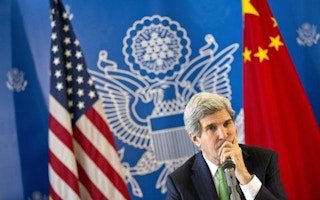LONDON – For many people around the world this year, the weather has become anything but a topic for small talk. Typhoon Haiyan in the Philippines, America’s record-breaking freeze, California’s year-long drought, and flooding in Europe have put the long-term dangers of climate change back on the political agenda. In response, United Nations Secretary-General Ban Ki-moon has sent an urgent letter to government, business, civil society, and finance leaders, urging them to attend a special Climate Summit in New York in September.
The event will be the first time that world leaders have met to discuss global warming since the UN’s fateful Copenhagen climate-change summit in 2009. Amid high expectations – and subsequent recriminations – that meeting failed to achieve a comprehensive, legally-binding agreement to reduce greenhouse-gas emissions. So, at September’s summit, leaders will be asked to re-boot the diplomatic process. The goal is a new agreement in 2015 to prevent average global temperatures from rising by two degrees Celsius, the level that the international community has deemed “dangerous” to human society.
At first sight, that looks like a hard task. Since Copenhagen, climate change has slipped down the global agenda, as the restoration of economic growth, voter concern about jobs and living standards, and violent conflict in key trouble spots have taken precedence.
But the tide may be turning. More people are grasping the true extent of the dangers ahead. In its latest authoritative assessment, the Intergovernmental Panel on Climate Change (IPCC) concluded last year that scientists are now 95 per cent certain that human activities are the principal cause of rising temperatures. Over the next two months the IPCC will release further reports detailing the human and economic impacts of probable climate change and the costs and benefits of combating it. US Secretary of State John Kerry recently described climate change as “perhaps the world’s most fearsome weapon of mass destruction,” warning of “a tipping-point of no return.” Few serious commentators now dispute the science.
“
New York will not be like Copenhagen. Leaders are not being asked to negotiate a new agreement themselves; that job will remain with their professional negotiators and environment ministers
So the key question now is how the world’s leaders will respond. There are grounds for cautious optimism.
First, New York will not be like Copenhagen. Leaders are not being asked to negotiate a new agreement themselves; that job will remain with their professional negotiators and environment ministers. Moreover, the process will not be concluded this year but at the UN climate conference in Paris in December 2015. That provides plenty of time to translate political commitments made in New York into a legally-binding accord.
Second, the world’s two largest greenhouse-gas emitters, the United States and China, are now more committed to action than they were five years ago. US President Barack Obama has announced a far-reaching plan that authorizes the Environment Protection Agency to take dramatic measures in the next few months to limit power-station emissions, virtually ending coal-fired electricity generation altogether.
In China, worsening air pollution and growing concerns about energy security have led the government to consider a cap on coal use and an absolute reduction in emissions within the next 10 to 15 years. The government is experimenting with carbon pricing, and investing heavily in low-carbon wind, solar, and nuclear energy.
Further, the two countries are actively cooperating. Last year Obama and Chinese President Xi Jinping committed to phase out hydrofluorcarbons, a potent greenhouse gas. In February, they announced their intention to work together on climate policy – a marked contrast to Sino-US tensions over Pacific security and trade issues. With the European Union also preparing to commit to new 2030 climate targets, hopes for a global deal are rising.
A third cause for optimism is the re-appraisal of climate-change economics. Five years ago, policies aimed at cutting greenhouse-gas emissions were seen as a cost burden on the economy. Negotiations were therefore a zero-sum game, with countries seeking to minimize their obligations while asking others to do more.
However, new evidence may be altering the economic calculus. According to research conducted by the Global Commission on the Economy and Climate, far from hurting the economy, well-designed climate policy may actually boost growth. Chaired by former Mexican President Felipe Calderón and comprising former prime ministers, presidents, and finance ministers, the Commission is analyzing how investments in clean-energy infrastructure, agricultural productivity, and urban transport could stimulate sluggish economies. Its conclusions will be presented at September’s summit; if accepted, the Commission’s work could mark a turning point, transforming the way in which climate policy is perceived by the world’s economic policymakers.
None of this guarantees success. Powerful vested interests – not least the world’s fossil-fuel industries – will no doubt seek to limit progress, and most governments are not yet focused on the problem. But one thing is certain: the reality of climate change is making it impossible to ignore.
Michael Jacobs is senior adviser at the Institute for Sustainable Development and International Relations in Paris and a visiting professor at the Grantham Research Institute on Climate Change and the Environment at the London School of Economics. This post originally appeared in Project Syndicate.

















